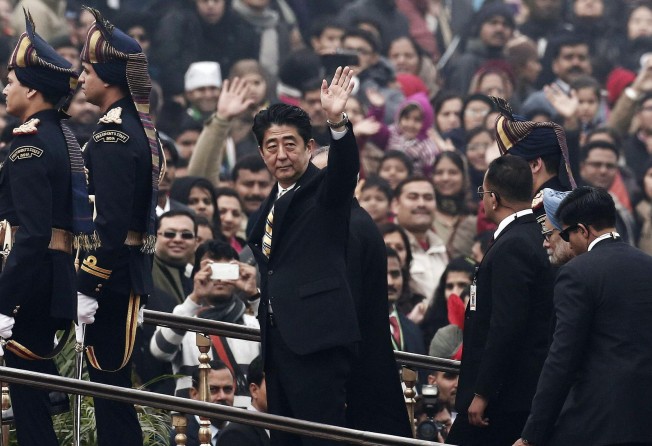Japan, India agree to boost defence ties in face of more assertive China
Plan that includes regular maritime exercises reached in the face of China's assertiveness

India and Japan affirmed plans to "further strengthen" defence co-operation against the backdrop of an increasingly assertive China.
The agreement was reached at a New Delhi meeting between Indian Prime Minister Dr Manmohan Singh and his Japanese counterpart, Shinzo Abe, who began a three-day visit to India on Saturday.
Singh and Abe also "renewed their resolution" that both nations conduct joint maritime exercises on a "regular basis with increased frequency".
Coming against the backdrop of a bitter territorial row between Japan and China over the Diaoyu, or Senkaku, islands in the East China Sea, analysts have said Abe's India trip will be keenly watched by Beijing.
Underscoring the importance India attaches to ties with Japan, Abe was the guest of honour yesterday at the annual Republic Day parade.
Abe, who is accompanied by a heavyweight Japanese business delegation, and Singh, held "extensive talks" on bilateral, regional and global issues, the statement said.
Afterwards, Abe announced a US$2 billion low-interest loan for extending the Delhi Metro and promised increased Japanese economic co-operation on other infrastructure projects. New Delhi is seeking US$1 trillion in investment over five years to upgrade infrastructure and bolster stuttering economic growth.
Tokyo is already India's fourth-largest investor, involved in building the US$90 billion Delhi-Mumbai Industrial Corridor linking India's capital with financial hub Mumbai.
Calling Japan a key economic development ally, Singh said: "The partnership between a strong and economically resurgent Japan and a transforming and rapidly growing India can be an effective force of good for the region."
Abe avoided any public mention of the dispute over the Diaoyu/Senkaku islands. However, he told The Times of India newspaper the "security environment of the Asia-Pacific region is becoming ever more severe".
Japan also pushed the sale to India's military of its amphibious search and rescue ShinMaywa US-2 planes. The planes would be unarmed, so as not to break Tokyo's self-imposed prohibition on military exports.
But with Abe having declared he wants to review the ban on weapons exports, such a sale might open the door for the sale of military equipment to India, a huge arms importer, analysts say.